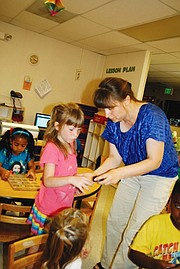New U.S. citizen passes test
Herald Staff Writer | Hagadone News Network | UPDATED 13 years, 7 months AGO
MOSES LAKE - Lyubov Konovalchuk, her husband and mother Maria Zhuravleva decided it was best not to take chances, back in 1999.
Natives of Ukraine, Lyubov and her family were also practicing Baptists, and even though Ukraine was free, it was less than a decade since professing belief in Christianity could get Christians into trouble.
The old Soviet Union was officially an atheist country. And there was a time when keeping the faith in the Soviet Union, back when Lenin and Stalin were in charge, could get Christians killed. By the time Lyubov, 44, was born, the Soviet government no longer put Christians in the Gulag. But that didn't mean the commissars left people alone.
Church congregations were kicked out and the buildings demolished, or converted to other uses. At one time there were only two churches in all Ukraine, Lyubov said. Sometimes - Lyubov she suspects it was most frequent when the government needed money - government workers would stand outside church doors and threaten worshipers with fines, especially if they brought their children.
"They didn't want kids at the churches," Lyubov said. Parents faced fines of as much as half a month's pay. "Over there it was really hard for the Christian people," she said.
Things improved after the fall of the Soviet Union in 1991 and Ukraine's breakaway to establish itself as an independent state. Many of the churches that had been destroyed were rebuilt; within a few years her hometown of Melitopol had 10 churches.
But the family still didn't feel secure. "It was better, but you never know about the future," she said. They didn't know who would be running Ukraine, and they didn't know who might come back, Lyubov said.
Her sister, husband and family had moved to the United States, to a place called Moses Lake. They invited Lyubov, her husband and mother to join them.
It was a change. "Oh, yes, a big change." It was a different culture, the people wore different clothes, ate different food. They spoke a different language, one Lyubov and her family didn't know. Maybe the biggest change was just Moses Lake, as compared to Melitopol. "My city is huge and Moses Lake is kind of small," Lyubov said.
The family adapted. "We came in May and we started right away in the English as a Second Language classes," she said.
"In 10 months you learned English," said Angela Weber, her friend and fellow employee at the college's child care center.
"I had some experience with kids," Lyubov said, and she applied for a job at the Learning Center. She was a Sunday School teacher in Ukraine, she said, but she wasn't allowed to teach elsewhere because of her religious faith. So she worked in a factory, keeping records on the machinery for those times when equipment broke down.
She joined the staff at the Learning Center in January 2001. She had worked there since.
She still has family in Ukraine, and they report conditions have improved. Christian worship is more openly tolerated, and Christians are allowed to work in occupations they were banned from 20 years ago. But Lyubov and her family don't plan to go anywhere, she said.
And she started to think maybe it was time to get more involved in this new country. For one thing, in her opinion it needed more Christian voters, she said. "I come from Communism," she said, and she doesn't want the United States to go down a similar road.
"I just think if we have more Christian people, we can make better decisions for this country," she said. Lyubov and her husband decided to become American citizens.
Potential citizens are given a test with 100 possible questions, out of which they must answer 10. The questions cover American civics, history and geography. Lyubov said it was challenging, especially when dealing with last names and linking the person to the achievement.
Some of the questions stumped those among her friends who were born here. "She would ask, and I would say, 'Let's look at the internet,'" Weber said.
Lyubov and her husband took the test Wednesday in Yakima. The evaluators chose 10 questions at random and applicants must answer at least six to pass. "I answered the first six and she (the evaluator) said, You're done.'" Lyubov's husband passed also.
They were sworn in as citizens that day, but there will a formal ceremony at a date to be determined, she said.
ARTICLES BY HERALD STAFF WRITER

Staatses plead not guilty
EPHRATA - The Moses Lake couple, accused of refusing to take their child to a hospital as the boy was starving, pleaded not guilty Tuesday.

Central Wash. Home Expo this weekend
MOSES LAKE - Basin residents wanting to build a new home, or renovate an existing one, can turn to next weekend's Central Washington Home Expo for inspiration.

Nurse practitioner program begins in Othello
Application deadline is May 15
OTHELLO - The Columbia Basin Health Association will start a training program for nurse practitioners, beginning in September. The program's application deadline is May 15.



